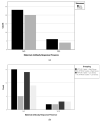The Relationship between Maternal Antibodies to Fetal Brain and Prenatal Stress Exposure in Autism Spectrum Disorder
- PMID: 37233704
- PMCID: PMC10224143
- DOI: 10.3390/metabo13050663
The Relationship between Maternal Antibodies to Fetal Brain and Prenatal Stress Exposure in Autism Spectrum Disorder
Abstract
Environmental and genetic factors contribute to the etiology of autism spectrum disorder (ASD), but their interaction is less well understood. Mothers that are genetically more stress-susceptible have been found to be at increased risk of having a child with ASD after exposure to stress during pregnancy. Additionally, the presence of maternal antibodies for the fetal brain is associated with a diagnosis of ASD in children. However, the relationship between prenatal stress exposure and maternal antibodies in the mothers of children diagnosed with ASD has not yet been addressed. This exploratory study examined the association of maternal antibody response with prenatal stress and a diagnosis of ASD in children. Blood samples from 53 mothers with at least one child diagnosed with ASD were examined by ELISA. Maternal antibody presence, perceived stress levels during pregnancy (high or low), and maternal 5-HTTLPR polymorphisms were examined for their interrelationship in ASD. While high incidences of prenatal stress and maternal antibodies were found in the sample, they were not associated with each other (p = 0.709, Cramér's V = 0.051). Furthermore, the results revealed no significant association between maternal antibody presence and the interaction between 5-HTTLPR genotype and stress (p = 0.729, Cramér's V = 0.157). Prenatal stress was not found to be associated with the presence of maternal antibodies in the context of ASD, at least in this initial exploratory sample. Despite the known relationship between stress and changes in immune function, these results suggest that prenatal stress and immune dysregulation are independently associated with a diagnosis of ASD in this study population, rather than acting through a convergent mechanism. However, this would need to be confirmed in a larger sample.
Keywords: 5-HTTLPR; autism spectrum disorder; gene expression; immune system; stress.
Conflict of interest statement
David Beversdorf has been a consultant on the advisory board for Yamo Pharmaceuticals, Stalicla Biosciences, Impel Pharmaceuticals, Scioto Pharmaceuticals, and Human Biosciences, which are all unrelated to this work. Judy Van de Water is the founder of MARAbio, a UC Davis startup formed to develop the maternal autoantibody test for use clinically. The remaining authors declare that the research was conducted in the absence of any commercial or financial relationships that could be construed as a potential conflict of interest.
Figures

References
-
- Hallmayer J., Cleveland S., Torres A., Phillips J., Cohen B., Torigoe T., Miller J., Fedele A., Collins J., Smith K., et al. Genetic heritability and shared environmental factors among twin pairs with autism. Arch. Gen. Psychiatry. 2011;68:1095–1102. doi: 10.1001/archgenpsychiatry.2011.76. - DOI - PMC - PubMed

